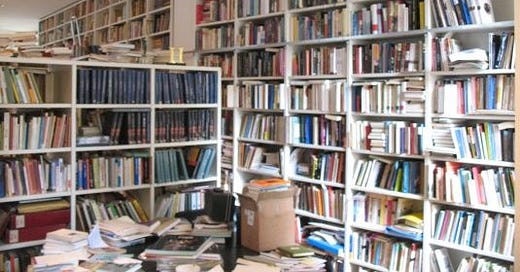My apartment is filled with books I will never have time to read. Some of them fit on my bookshelf, but mostly they are scattered haphazardly in piles throughout my home. My digital bookshelf is also large. Yet I keep buying them.
Why do I do this? Is it overconfidence or limited impulse control? Do I wildly misperceive my own desire to read?
All of these factors probably hold some truth. But I think it primarily comes down to aspiration. I want to become the type of person who reads mountains of books on subjects both practical and arcane.
To those who have been following this blog from the beginning this may be a little puzzling. One of my earliest posts posited that books were becoming less important. Sadly, I believe books are becoming less important as a cultural medium. Attention spans are declining and even lifelong lovers and writers of books are moving on to other things.1
But to me filling my home with books and paging through obscure volumes in bookstores and libraries is not really about engaging with popular culture. Surrounding myself with books inspires me to learn and reminds me how little I know. It helps me become something I haven’t quite reached yet, and may never fully reach to my own satisfaction.
Aspiration isn't a good thing. It actually kind of sucks. It often feels terrible. It means you're bad at something. You feel embarrassed and ashamed of yourself. You're learning instead of knowing. None of that is good.
What's good is the improved condition that you're going to get to; and it's worth it because that value is important. And, if that value is not important or if it's not worth the effort you're putting into it, you shouldn't do it.
While it is impossible to really know that all this aspirational reading will be worth it in the end, I have some concrete hopes for what I hope it will do for me. Here are a few things I hope to gain by reading:
Reading fills me with a sense of wonder, as well as humility about my own limitations. Niall Ferguson expressed this sentiment well:
If I hadn’t been sent to the Mitchell Library as a schoolboy, I wouldn’t have understood that history was this unmanageable quantity of data. I remember seeing the shelf of books about the Thirty Years’ War. I’d been asked to write an essay on the Thirty Years’ War. I went to the Mitchell Library, and there were all the books on the Thirty Years’ War. And it hit me, “Oh my God, there are just hundreds of them.”
That was when the challenge of history suddenly gripped me, that there was this vast, almost unmanageable body of literature to read on any topic.
When information is curated to people with shorter attention spans, it is often sanitized and dumbed down. By reading physical books, I hope to avoid this problem.
Books help solve the problem of discerning what will stand the test of time. What is trending on Twitter today is probably fleeting in importance, while something that has gone through the full process of writing, revision, and publication was at least compelling enough to hold someone’s attention for a prolonged period of time. The longer a book has been around, the more likely it is to maintain relevance.
I understand that cultural inertia is strong. Part of the reason I stopped reading for a period in my life was because I looked around at the reading habits of my peers and inferred that reading wasn’t something that modern people did or that it was incompatible with the busyness of adulthood. But I was fortunate enough to find role models who read widely, both in person and online, that inspired me to be like them. If you are someone who doesn’t yet read widely, but aspires to, I hope this blog is a help to you. Aspiration requires help.
CTRL-F “We’re a dwindling number”



